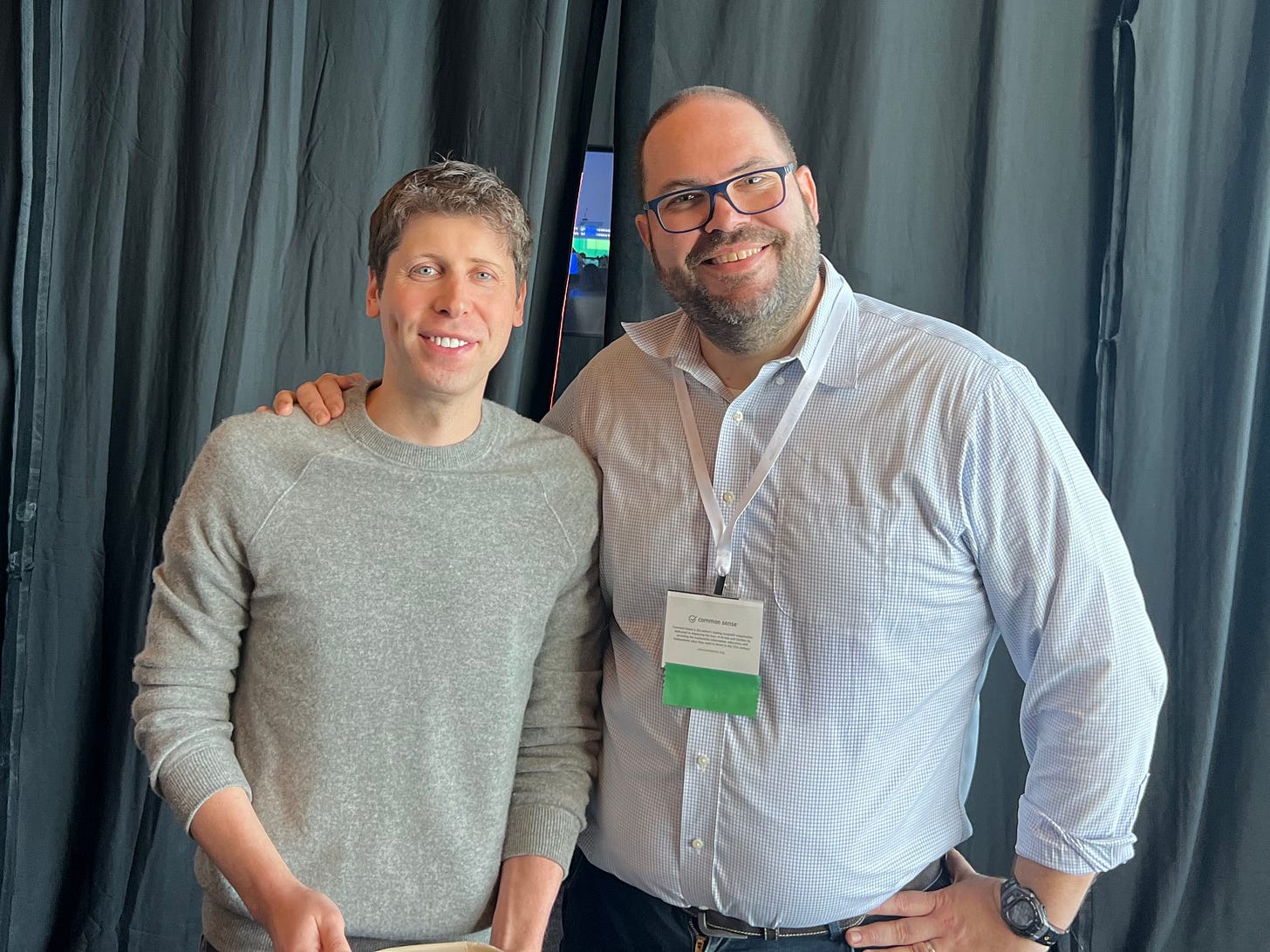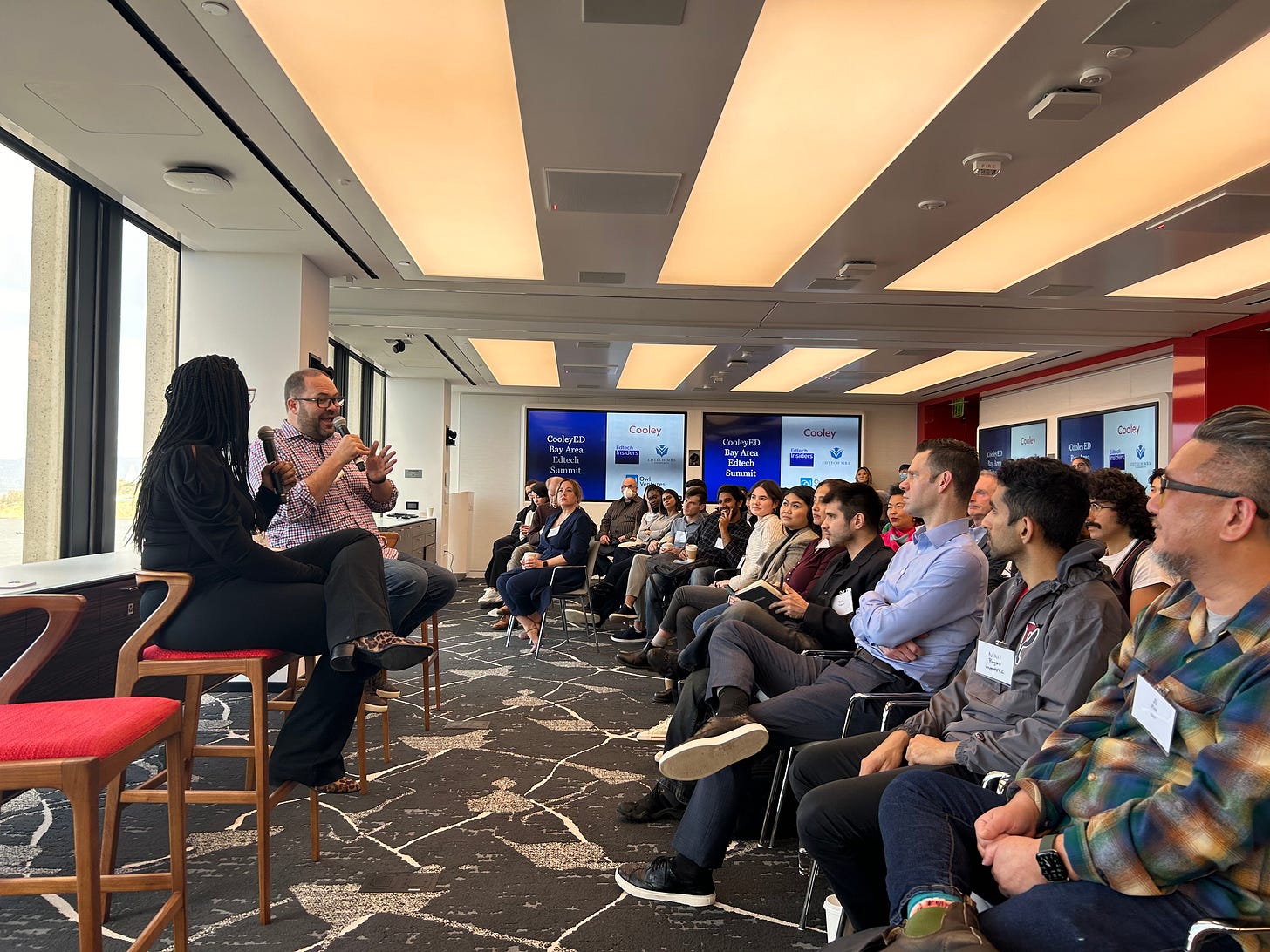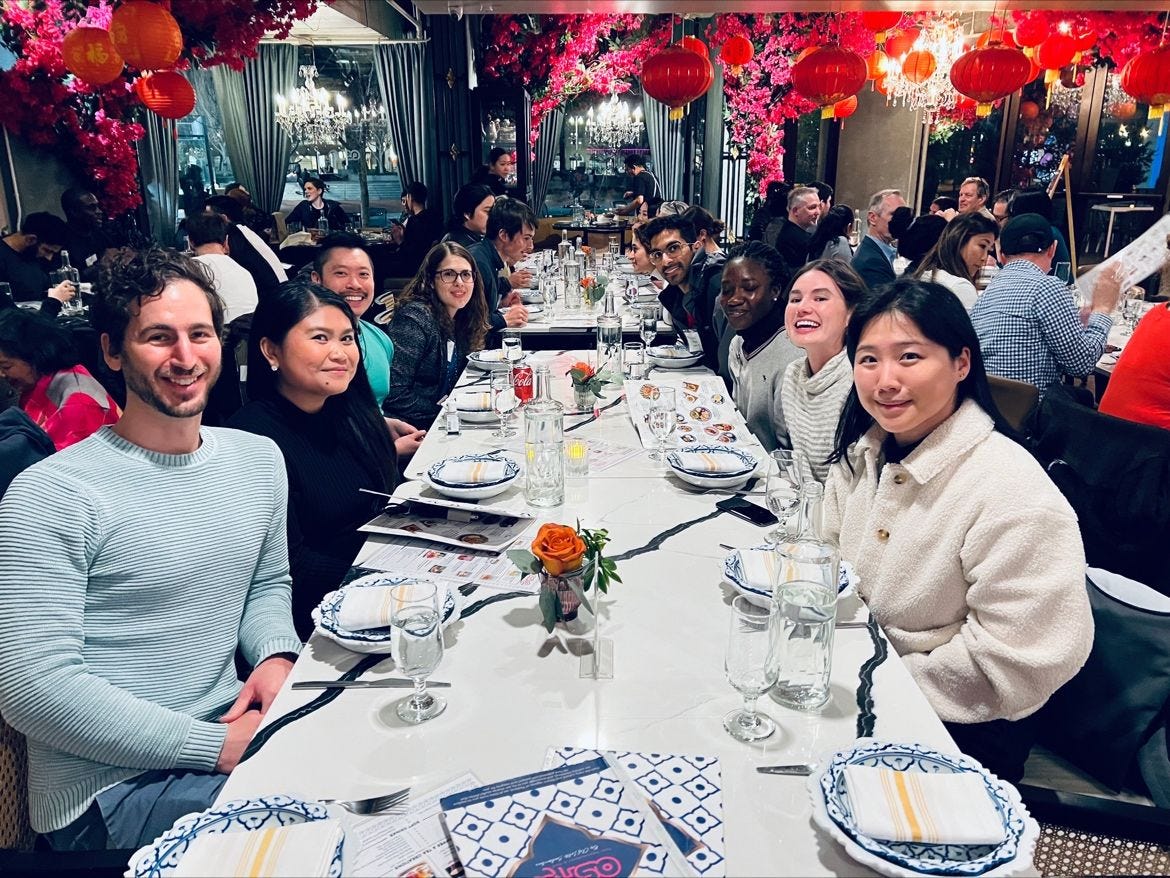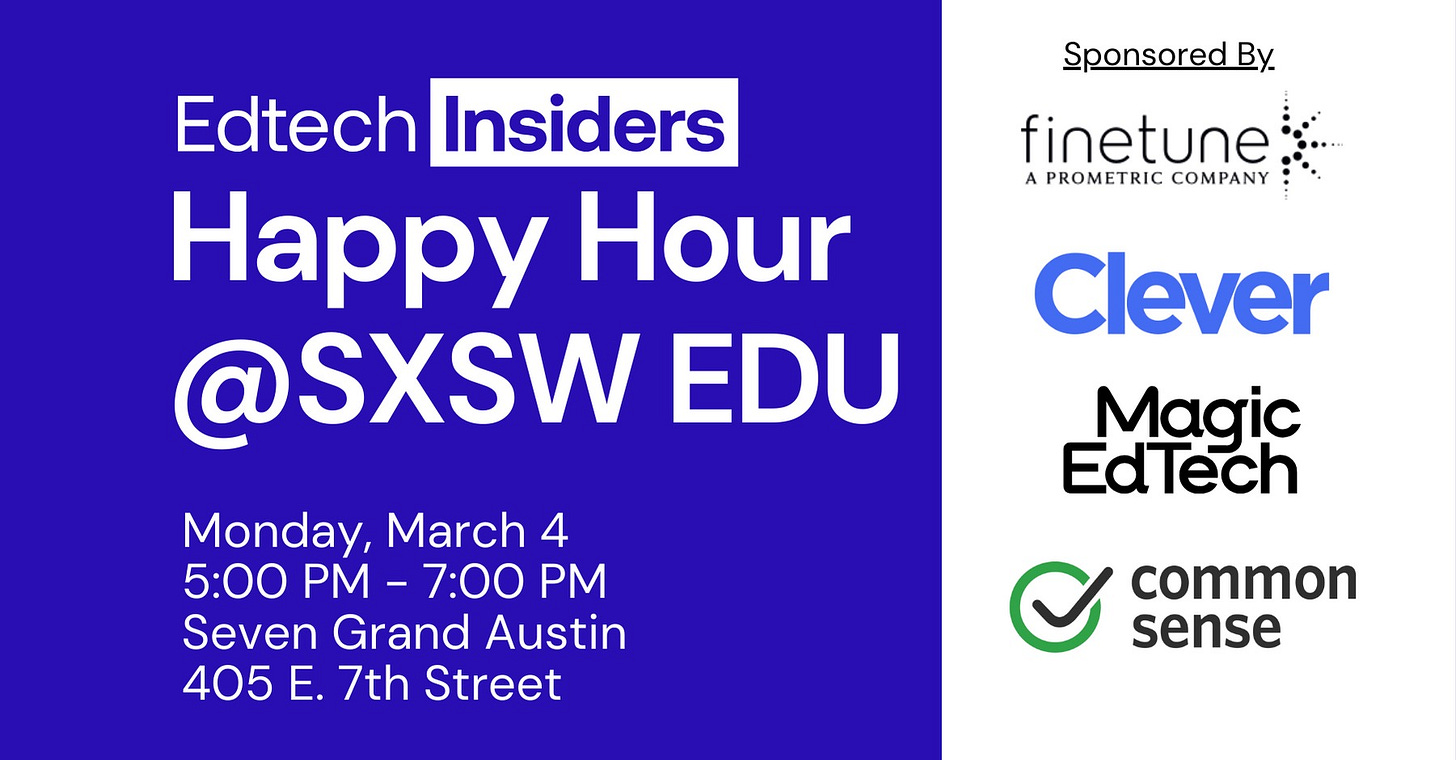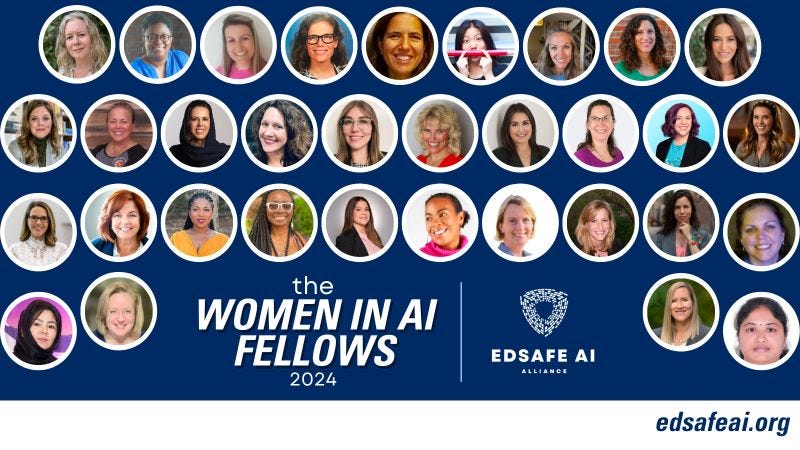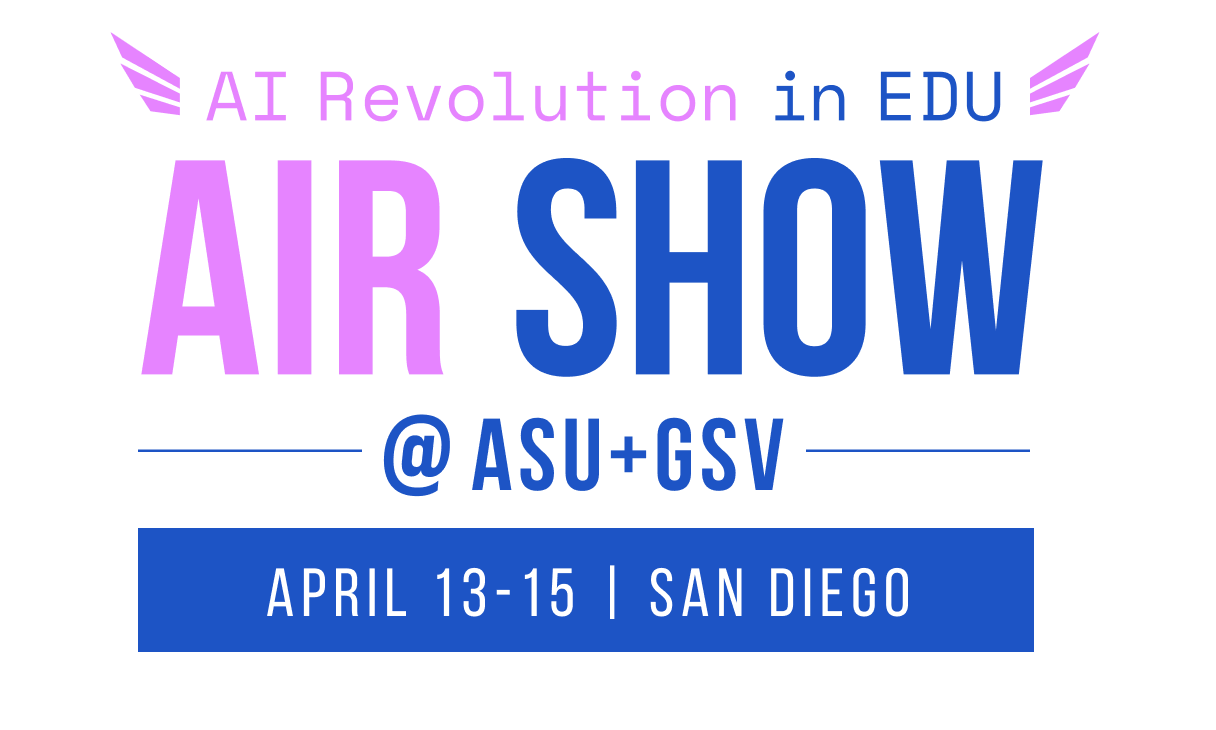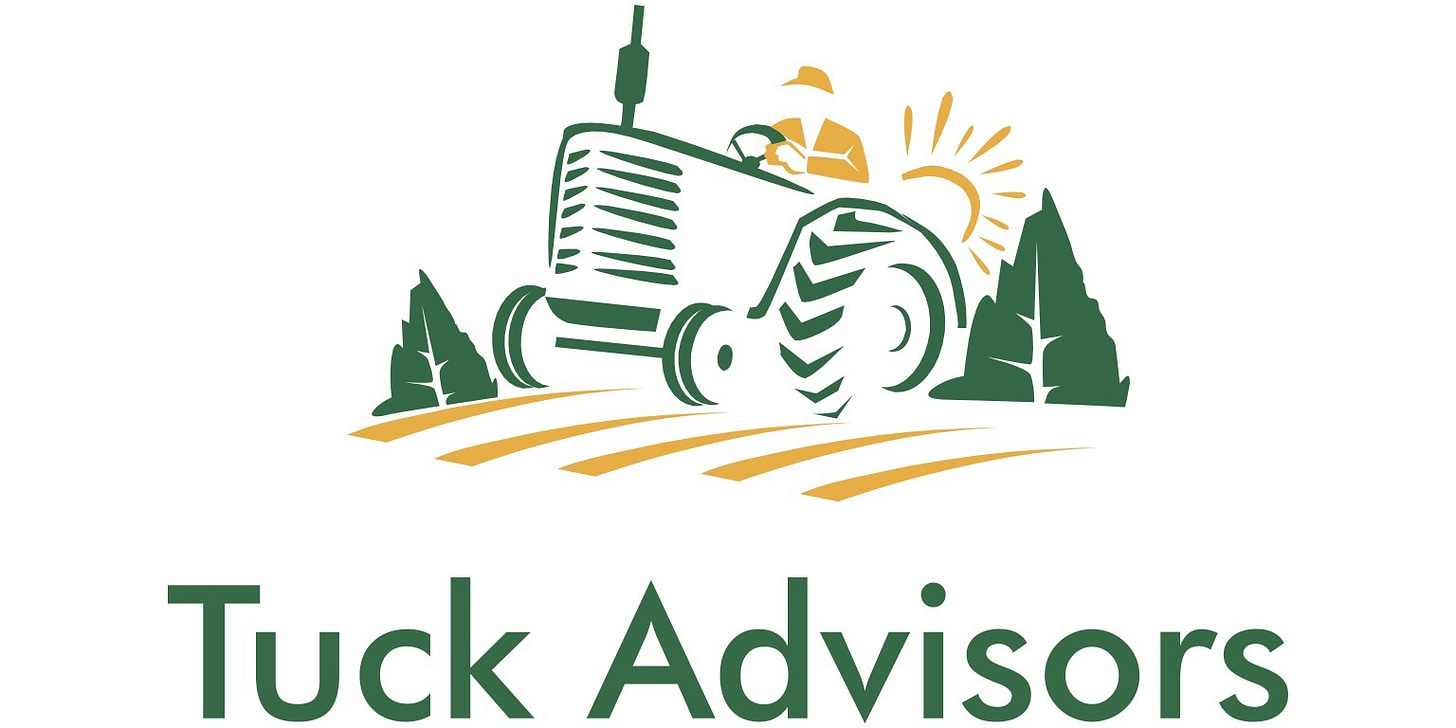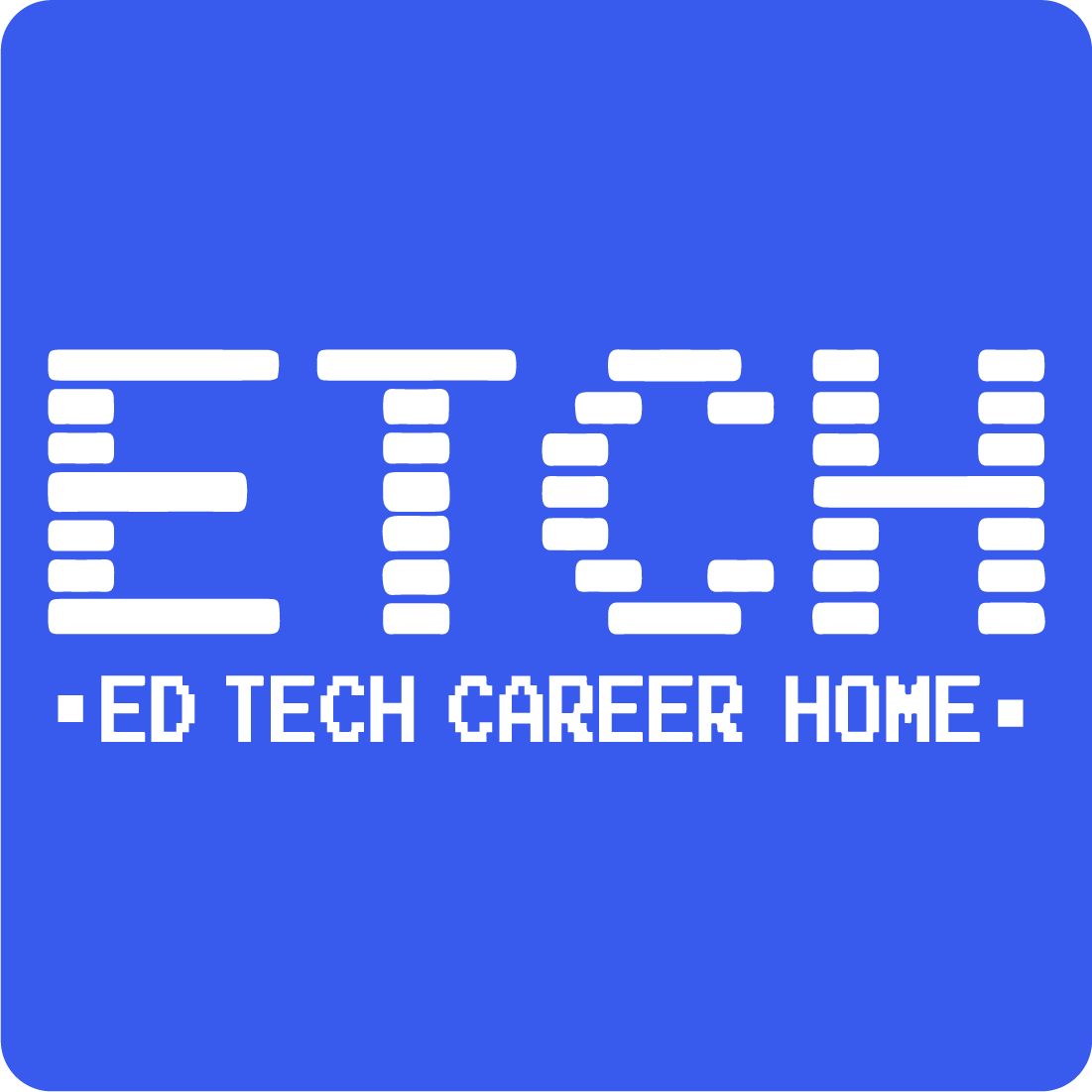Special Interview: Sal Khan
SXSW EDU Happy Hour, Zum, Roblox, Shaq Investing in Campus, EDSAFE AI Alliance Fellows, and more!
Special Interview: Sal Khan
This week, Ben and Alex had the great pleasure to interview Salman Khan at The Common Sense Summit! Sal Khan is the founder of Khan Academy and the Khan Lab School, an advocate for the responsible use of AI in education, and one of the all-time legends of edtech. We will be releasing the full interview audio in an upcoming episode of the pod, but for now, we wanted to share a few highlights of the conversation:
On The Early Days of Khan Academy
“…you know, I have an original background in tech, and I think when I started writing software, it was obvious to me in theory, it could scale. And I was working with my cousins, but in theory, maybe one day it could be 15 thousand, 15 million. And then I would say, “Sal, stop thinking delusionally; you're just doing this for your family”. In the late 90’s, I had failed startups and it was just so emotionally taxing. Like, ‘this is not a startup, this is a family project. Don't ask me about it.’ But I did think about it.”
And then what surprised me is even as a hobby, from 2004 to 2009, it was gaining traction. In 2008, as you mentioned, we incorporated as a nonprofit. I don't own Khan Academy, no one does. Admission free world class education for anyone, anywhere. Even then I thought I was gonna keep my hedge fund job; this was going to be like my side nonprofit, but in 2009 I stopped focusing on my day job and took the plunge. Then what surprised me- what was the downside to that? No one seemed to care…
But then eventually, but all of a sudden went from zero to a lot where folks like Ann and John Doerr and I didn't even know that Bill Gates was using Khan Academy with his own kids, executives at Google were using Khan Academy with their own kids and we started growing and I think that's what a lot of folks really started to know Khan Academy.”
On the Resistance to Change of the Education System
“…on one level, if you told me in 2008 that in 2024, Khan Academy would have 160 million registered users I’d be like, ‘Oh, my God, that's incredible.’ But at the same time, I would have assumed that with 160 million registered users, that the education system (would be) fundamentally different— that personalization would be the norm, that every teacher would be empowered with really good data, really actionable things, right where they need it, that most students wouldn’t just be promoted forward, even though they have this unfinished learning... And it hasn't happened. Unfortunately, in a lot of cases, maybe because of the pandemic, we've regressed a bit.”
On Gaining Early Access to GPT4
So we've always had this view of like, okay, we will kind of want to be a tutor for every student. And we always want to be a teaching assistant for every teacher. Then summer 2022, Sam Altman, the CEO of OpenAI, and Greg Brockman the President, shot me an email, and they said, “Hey, we're about to finish training our next generation model”— which would end up being GPT4— this is them saying “we think this is the model that's going to get people excited, but maybe even a little scared, because it's going to be so powerful. So we want to launch with social positive use cases, with organizations that people trust that have the technical capability to take advantage of this.
And this is their own words, they said “The only thing we can think of is Khan Academy.” And so I took the meeting. I knew of them. I knew that GPT 1,2, 3 was super cool from a technology point of view, but I didn't think it was ready for primetime. But when they showed what was possible…
…when they showed us GPT4, I think, myself and Kristen, who's the Chief Learning Officer, we were probably one of the first 20 people in the world, even before a lot of OpenAI saw it. Even though it had real issues— the math was not up to par, it was hallucinating— but it was dramatically better than anything we had ever seen. And we started putting, essentially, all of Khan Academy on a nondisclosure agreement. And we started playing with it and seeing what was possible… there are ways through the math, there are ways to reduce hallucinations, especially when you anchor it in all the content that we had been making for 15 years plus.
On The Choice to Scale to Districts
“…fast forward to about 2016. And even at that point, we had about 50 efficacy studies that all showed the same narrative that if students were able to put 30 to 60 minutes a week on Khan Academy doing personalized practice in math- that's where all the studies were- the students, depending on the study, were accelerating someplace between 20% and 50% faster than they otherwise would have. That's great. But we realized that as a nonprofit (we wanted to) actually move the dial for districts, states, countries eventually. So we started going to superintendents and started saying “look, look at the efficacy studies. And by the way, you already have 80 teachers in your district using Khan Academy. How do we work with the other 80 to use it?”
And with almost every conversation went something like, “oh, well, I believe you, because my son/daughter/niece/nephew uses Khan Academy.” For younger superintendents, some of them, apparently, we helped through grad school for their stats and whatever else.
So there was that trust and that belief. And I think that's important, because so many Edtech tools, they can do a nice presentation, but nobody has ever used it, the decision makers have never actually used the tools themselves. And so we view that as a very strong badge of honor. Someone can say, “Oh, I used it” or “my coworker swears by it.”
Then the next sentence that Chief Academic Officers or superintendents say, is “but if you want us to use Khan Academy for all of our classrooms, you have to get us support, training, integration with our rostering systems, district level dashboards.” And that was scary for us because we never had boots on the ground in that way, so to speak. But we realized if we're serious, we needed to do it.
For more insights on the Khan Academy story, Khanmigo and AI, Khan’s new automated essay tool, and Khan’s pandemic surge, stay tuned for the upcoming interview on our podcast!
This edition of the Edtech Insiders Newsletter is sponsored in part by Flint!
Flint is an AI tutoring platform for schools built specifically to support teacher-student relationships. Teachers can create dynamic chat assignments, essays, and tutors powered by AI that adapt to fit each student’s knowledge level and pace. Check out our website to learn more about how top schools are using Flint to help teachers personalize learning with AI!
Past Events
Our team has had a busy few weeks! First, we were at The Common Sense Summit and had the chance to interview a ton of amazing edtech thought leaders! We’ll be releasing podcast episodes, written transcripts, and more from this event in the coming weeks, so stay tuned!
And, this week Edtech Insiders cohosted The 2024 CooleyED Bay Area Edtech Summit! There were 185+ attendees, some incredible panels, and wonderful shared dinner time to connect, discuss, and laugh together.
We had so much fun and learned a lot – if you haven’t made it out to one of our in person or digital events we would LOVE to see you at the next one!
Upcoming Events
SXSW EDU Happy Hour
Join us at SXSW EDU for a special happy hour event! The event will be hosted on March 4 in Austin at Seven Grand (405 E 7th St, Austin, TX 78701). Come join our community to connect, collaborate, and enjoy a drink together! Please RSVP if you plan to attend!
This event is co-hosted by Finetune, Clever, StartEd, Magic EdTech, and Common Sense!
Edtech Insiders is proud to be hosting an upcoming webinar on February 23rd about the in and outs of edtech public relations.
Charlotte Ward has over a decade of experience leading PR and communications for education companies like Coursera and 2U. She is currently a consultant for early stage Edtech startups serving the Pre-K to workforce development landscape.
Join Charlotte and Alex for a workshop to learn how Edtech companies should think about the value of PR, how to pull off a great media interview, and how to secure those coveted media hits that can catapult your organization into the limelight.
The webinar is free of charge, but space is limited- reserve your seat now!
Top Edtech Headlines
1. Zum Raises $140M Series E
Zum – an edtech company that leverages AI to increase efficiency and reduce cost of managing bus fleets for school districts – recently raised a $140 million Series E led by GIC at a $1.3 billion valuation. Climate Investment, and existing investors Sequoia Capital and SoftBank Vision Fund 2 also participated in the funding round.
2. Roblox: The Future of Playful Assessment
Northwest Evaluation Association (NWEA), which publishes the widely used MAP Growth tests, recently collaborated with Roblox to create a high efficacy physics test for students that is interactive and play based. This experiment is leading to further optimism about testing applications and the world of possibilities embedded and playful assessment hold for education.
3. Shaq and Sam Altman Invest in Campus
A new edtech startup called “Campus” is being built to end stigmas associated with community college and make college affordable and flexible for students of all life circumstances. And they have some help - Shaq, Sam Altman, Discord’s Jason Citron, and Bloomberg Beta are a few of the investors who have already contributed $29 million to the company.
4. EDSAFE AI Alliance Announces Two New Fellowship Cohorts
The EDSAFE AI Alliance recently announced it’s new cohorts for both The AI Catalyst Fellowship and The Women in AI Fellowship! Read more about each below, and check out the LinkedIn profiles for some of these fellows! (It seems that full fellow lists haven’t been released yet, so the included links were what we were able to decipher from LinkedIn).
The AI Catalyst Fellowship is a year-long program that supports exceptional and impact-minded individuals by providing an outstanding platform to learn and work on questions of AI in education. Fellows have the opportunity to work with world-renowned experts in AI safety, ethics, and policy. They also participate in a rigorous seminar series, where they learn about the latest advances in AI research and discuss the potential impacts of AI on society.
Designed for leaders in the education sector from industry and the field, this interdisciplinary fellowship brings together leaders on the supply and demand side to reimagine education as a learning system enabled by AI.
The Catalyst Fellowship is open to anyone in the field of education, including industry. International applicants are welcome to apply.
The Women in AI Fellowship is a year-long program that supports exceptional and impact-minded individuals by providing an outstanding platform to learn and work on questions of AI in education. Fellows have the opportunity to work with world-renowned experts in AI safety, ethics, and policy. They also participate in a rigorous seminar series, where they learn about the latest advances in AI research and discuss the potential impacts of AI on society.
Designed for women technologists and leaders, this Fellowship creates a space for learning, support, and building a network. Built for leaders in the education sector from industry and the field, this interdisciplinary fellowship brings together leaders on the supply and demand side to reimagine education as a learning system enabled by AI.
Fellows Include:
Ashley Stephens
This edition of the Edtech Insiders Newsletter is sponsored in part by AIR Show!
Join the AI Revolution in education! Register for AIR Show, April 13-15, at the San Diego Convention Center for brilliant keynotes, hands-on workshops, student hackathons, 125+ leading AI in EDU companies, and more.
Podcast Deep Dive: Lydia Logan
We have had some amazing guests on The Edtech Insiders Podcast in the last few weeks. One of our stand-out interviews from this past week is Lydia Logan, the Vice President of Global Education and Workforce Development and Corporate Social Responsibility at IBM.
Here’s a deep dive on our interview with Lydia, and we encourage you to give the full episode a listen for more!
In this episode of The Edtech Insiders Podcast, Lydia Logan detailed her extensive journey in the field of education technology and upskilling, rooted in a profound passion for education and technological empowerment. Her path from working with nonprofits to spearheading IBM's global education initiatives showcases a dedication to leveraging technology for educational equity and opportunity.
"My grandmother was a great inspiration to me and always said, you know, knowledge is the one thing you can't take away from people... This role that I have now doing it on a global scale really brings together what I've been doing for the last 20-25 years." - Lydia Logan
IBM's SkillsBuild Initiative
Lydia elaborated on the SkillsBuild program, IBM's flagship global initiative aimed at democratizing access to education across various languages. This program targets the enhancement of employability through digital credentials in cutting-edge fields such as cybersecurity and AI, especially for those from underserved communities.
"Through [SkillsBuild], we reach people like Oscar Ramirez... he found SkillsBuild through HHF and started earning some of our IBM digital credentials on cybersecurity and AI, and was able to ultimately get a role in one of those positions." - Lydia Logan
Rethinking Micro-credentials and Hiring Practices
Discussing the pivotal shift toward skills-based hiring and the integration of micro-credentials, Lydia Logan shed light on IBM's approach to fostering educational pathways that are inclusive of non-traditional learners. This strategy emphasizes the recognition of skills over degrees, broadening opportunities for a diverse workforce.
"IBM, for example, has eliminated the four-year degree requirement from 50% of our US job postings... It has meant we have hired people who ordinarily wouldn't have been considered because they wouldn't have been in the pool in the first place." - Lydia Logan
Mentorship and Soft Skills Development
Highlighting the importance of mentorship and the cultivation of broad professional skills, Lydia spoke to the comprehensive approach IBM takes in equipping individuals not only with technical knowledge but also with critical soft skills, such as design thinking and effective communication, essential for career longevity and success.
"Our IBM volunteers play a crucial role in bridging the gap between technical skills and real-world application. By sharing their journeys, they not only inspire but also illuminate the path for learners to see themselves in roles they might never have considered. It's about showing that beyond the technical prowess, it's the human skills like empathy, leadership, and adaptability that truly make a difference in one's career." - Lydia Logan
Navigating the AI Revolution in Education
Lydia Logan dove into IBM's efforts to educate the public on AI, stressing the importance of ethical considerations and the transformative potential of AI in making quality education accessible worldwide. This includes fostering an understanding of AI that empowers individuals to use it safely and effectively.
"As we venture deeper into the AI era, our mission extends beyond merely teaching AI skills. It's about cultivating a mindset of ethical AI use and understanding its broader implications on society. By integrating AI education with ethical considerations, we're not just preparing individuals for the workforce; we're shaping responsible digital citizens equipped to navigate the complexities of a technology-driven future." - Lydia Logan
Curious to Learn More?
You can listen to our full interview with Lydia Logan, as well as interviews with many other edtech founders, investors, and thought leaders at The Edtech Insiders Podcast!
This edition of the Edtech Insiders Newsletter is sponsored by Tuck Advisors.
Tuck Advisors is a trusted name in education M&A. Founded by serial entrepreneurs with over 25 years of experience starting, investing in, and selling companies, we believe founders deserve M&A advisors who work as hard as they do. If you receive any UFO's™, unsolicited flattering offers, be sure to reach out to us at confidential@tuckadvisors.com. We can help you determine if it's a hoax or if it's real.
Funding, Mergers, and Acquisitions
Our latest reporting on funding, mergers, and acquisitions comes from Matt Tower’s publication EdTech Thoughts. Matt does an incredible job of covering the latest funding, news, industry updates, and more! If you love Edtech Insiders, be sure to subscribe to Matt’s newsletter as well.
Funding
Zum raises $140M on $1.3B valuation / US, K12 Infrastructure (Transportation) / GIC, Sequoia Capital, Softbank Vision Fund
Morressier raises $16.5M / Germany, Research Publishing / Redalpine, Owl Ventures, Cherry Ventures
Pintar raises $3M / Indonesia, Training Provider (Recruitment) / Havez Capital, SIG Venture Capital
iStoria raises $1.3M / Saudi Arabia, Language Learning / Nama Ventures, Classera, Flat6Labs, BIM Ventures
Elice raises $14.9M / Korea, LMS / Vertex Holdings
Beedeez raises €8M / France, Upskilling platform / Arkea Capital, Swen Capital Partners
Redrob raises $4M / South Korea, Recruitment Platform (Assessment) / Murex Partners, DS & Partners
UpSmith raises $3.3M / US, Recruitment Platform (Bootcamp) / A16Z, Asymmetric Capital, GSV, Accel
Acquisitions
ETS acquires PSI / US, Assessments
Avathon Capital acquires Magical Beginnings / US, Early Childhood Providers
Roper Technologies to acquire Procare for $1.75B / US, Childcare Platform
PowerSchool acquires Allovue / US, LMS (ERP)
Follett acquires Livingtree / US, Publisher (K12 Infrastructure)
Elentra acquires Skyfactor Benchworks / US, LMS (ERP)
Intelvio acquires Classward / US, Training Provider









